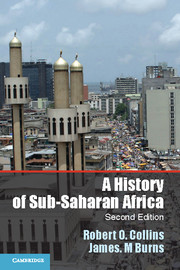Book contents
- Frontmatter
- Dedication
- Contents
- Acknowledgments
- Introduction
- Part I Foundations
- Part II Africa in World History
- Part III Imperial Africa
- 17 Upsetting the equilibrium
- 18 The European conquest of Africa
- 19 Southern Africa, 1486–1910
- 20 European colonial rule in Africa
- 21 The colonial legacy
- Part IV Independent Africa
- Index
- References
19 - Southern Africa, 1486–1910
Published online by Cambridge University Press: 05 June 2014
- Frontmatter
- Dedication
- Contents
- Acknowledgments
- Introduction
- Part I Foundations
- Part II Africa in World History
- Part III Imperial Africa
- 17 Upsetting the equilibrium
- 18 The European conquest of Africa
- 19 Southern Africa, 1486–1910
- 20 European colonial rule in Africa
- 21 The colonial legacy
- Part IV Independent Africa
- Index
- References
Summary
At the end of the fifteenth century, southern Africa was populated by peoples who spoke languages of either the Khoisan or Bantu families. Some of the Khoisan-speakers were hunter-gatherers, whereas others lived in small communities, raising livestock. The Bantu speakers clustered roughly into two cultural groups: the Sotho-Tswana, who occupied the highveld, and the Nguni, who had settled on the coast. The Khoisan-speaking herders lived along the fertile valleys of the Cape Peninsula. Although the enormous landmass of this southern subcontinent of Africa seemed very large for the Khoisan and Bantu-speaking peoples, they had successfully exploited its diverse environment – the arid Karoo of the San (often pejoratively called Bushmen), the grasslands of the Khoi (often pejoratively called Hottentots), and the moist grasslands of the coast and drier savanna of the highlands of the Bantu speakers. This was the world into which the first Portuguese mariners made landfall in southern Africa in 1486, to be followed in 1488 by Bartolomeu Dias, who rounded the Cape of Good Hope as far as Algoa Bay, and on his return voyage discovered the safe and strategic anchorage of Table Bay, modern Cape Town.
- Type
- Chapter
- Information
- A History of Sub-Saharan Africa , pp. 279 - 294Publisher: Cambridge University PressPrint publication year: 2013



